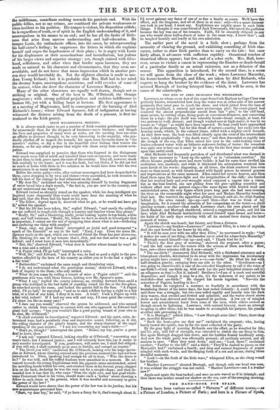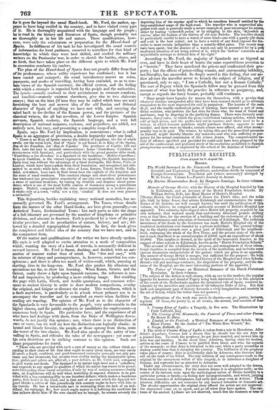THE HAND-BOOK POE SPAIN.
THERE have been various so-called " Pictures " of different towns,—as a Picture of London, a Picture of Paris ; and here is a Picture of Spain, for it goes far beyond the usual Hand-book. Mr. Ford, the author, ap- pears to have long resided in the country, and to have visited every part of it. He is thoroughly acquainted with the language and the people ; be is read in the history and literature of Spain, though probably not so thoroughly as in her life and nature. These qualifications, how- ever, were only the substratum or preparation for the Hand-book of Spain. In fulfilment of his task he has investigated the usual sources of information for local guidance, recurred to travellers for that kind of knowledge in which they were best skilled, and studied the military writers on the Peninsular war, in order to sketch the battles, sieges, and so forth, that have taken place on the different spots to which Mr. Ford in succession conducts his readers.
The plan of the Hand-book of Spain does not greatly differ from that of its predecessors, whose utility experience has confirmed ; but it has been varied and enlarged ; the usual introductory matter on coins, passports, and modes of travelling, having been extended, so as to con- tain views of the Spanish currency, the official system, and the feeling with which a stranger is regarded both by the people and the authorities. The hotels—usually confined to their preeminence in creature comforts, and banditti—.scarcely existent elsewhere, give rise to two elaborate essays; that on the inns (if inns they may be called which inns are not) furnishing the best and newest idea of the old Iberian and Oriental Character of Spain of anything we have met with, and carrying the mind back to the decline of the Roman power, and the pictures of the Classical writers, the all but novelists, of the Lower Empire. Spanish servants, Spanish cookery, the Spanish language, and a very full description of national manners, customs, and prejudices, are added, not entirely new, but racy, and presenting a complete coup-d'ceiL
Epain, says Mr. Ford by implication, is nonexistent ; what is called Spain is an aggregate of provinces, a double heptarehy under one head.
"Then is no King of Spans; among the infinity of kingdoms, the list of which avails out the royal style, that of 'Spain' is not found; he is King of the Spains, Bay de las Espatias, not 'Bee de Esparia."The provinces of Castile, Old and New, take the lead in national nomenclature; hence ' Castellano,' Castilian, is synonymous with Spaniard, and particularly with the proud genuine older stock. 'Castellano a as derechas,' is a Spaniard to the backbone; 'Hablar Castellano,' to speak Castilian, is the correct expression for speaking the Spanish language. Spain long was without the advantage of a fixed metropolis, like Rome, Paris, or London, which have been capitals from their foundation, and recognized and sub- mitted to as such; while here, the cities of Leon, Burgos, Toledo, Seville, Valla- dolid, and others, have each in their turns been the capitals of the kingdom and the seats of royal residence. This constant change and short-lived preeminence has weakened any prescriptive superiority of one city over another, and has been *cause of national weakness, by raising up rivalries and disputes about prece- dence, which is one of the most fertile sources of dissension among a punctilious people,. Madrid, compared with the cities above-mentioned, is a modern place; it ranks only as a town, not a city, ciudad.' It does not even possess &cathedral."
This disjunction, besides explaining many national anomalies, has ne- cessarily governed Mr. Ford's arrangement. The Tours, whose details funn the feature of the other Hand-books, are here given generally,—as Artistical Tours, Ecclesiastical Tours : but such parts as take the shape of a full itinerary are governed by the number of kingdoms or primitive divisions, and amount to fourteen. Each is prefaced by a view of the par- ticular province, and its peculiarities of nature, history, and art ; fol- lowed by a detailed topographical description. In fact, the book gives the completest and fullest idea of the country that we have met, and in the compactest form. Of the matter and qualifications of the writer we have already spoken. His style is well adapted to excite attention to a mode of composition which, wanting the story of a book of travels, is necessarily deficient in onward interest. Mr. Ford is fluent, dashing, and decided, with an ani- mation of manner rather than of mind. The "free and easy," with
its of slang and peremptoriness, is, however, somewhat too con- spicuous; and there is often too much of writer-craft, which, amusing at starling, tires in the long-run. Mr. Ford also pushes his allusions and quotations too far, to show his learning. When Rome, Greece, and the Orient, really throw a light upon Spanish customs, the reference is use- fttl and impressive, by producing a more striking image. But studding the page with Latin, Greek, and Arabic quotations, and constant refer- ences to ancient history in order to draw modern comparisons, overlay the original, and fatigue or distract the reader. This wordiness, which is a fault anywhere, is particularly so in a book whose primary use is to accompany the traveller and be consulted en route when facilities for reading are wanting. The opinion of Mr. Ford as to the character of the Spaniards is very &vourable to the people, very unfavourable to the higher classes, and the public employes or candidates for employment—a numerous body in Spain. His particular facts, and the experience of all who have had dealings with them, from the Duke of Wellington down- wards, do not justify this opinion ; nor, where there is no distinction of race or caste, can we well see how the distinction can logically obtain: in hratal and bloody ferocity, the people, or those sprung from them, seem the worst of the two classes. Mr. Ford also speaks of the safety of tra- velling in Spain, and ridicules the tales of the newspapers : yet some of his own directions are in striking contrast to this opinion. Such are these preparations for travel. "Those who are provided with such a slim of money as the robbers think ac- cording to their class of life that they ought to carry about them, are very rarely ill-used; a frank, confident, and good-humoured surrender generally not only pre- vents any bad treatment, but secures even civility during the disagreeable opera- tion: pistols and sabres are, after all, a poor defence, as Mr. Cribb said, compared to civil words and deeds. The Spaniard is by nature high-bred and a caballero,' and responds to any appeal to qualities of which his nation has reason to be proud: notwithstanding these moral securities, if only by way of making assurance doubly sure, an Englishman will do well when travelling in exposed districts to be pro- vided with abag containing fifty to one hundred dollars; which makes a handsome purse, feels heavy in the hand, and is that sort of amount which the Spanish bri- gand thinks a native of this proverbially rich (laundry ought to have with him on his travels. He haa a remarkable tact in estimating from the look of an indi- vidual, his equipage, &c, how much ready money it is befitting his condition for him behave about Em: if the sum should not -be enough, he resents severely the depriving him of the regular spoil to which he considers himself entitled by the long-established nea,ge of the high-road. The traveller who is nnprovided alto gether with cash is generally made a severe example of, pour encourager lea autras, either by beating edwadok palos,' or by stripping to the skin, dejaudale en mesas,' after the fashion of the thieves of old near Jericho. The traveller should be particularly careful to have a watch of some kind—one with a gaudy gilt chain and seals is the best suited: not to have a watch of any kind exposes the tra- veller to more certain indignities than a scantily-filled purse. The money may have been spent; but the absence of a watch can only be accounted for by a prd: meditated intention of not being robbed of it, which the kulron' considers as an unjustifiable attempt to defraud him of his right."
According to Mr. Ford, the majority of Spaniards are as bigoted as ever, and have in their heart of hearts the same superstitious aversion to
a "heretic." They have murdered the priests and confiscated their pro- perty; but the effects of priest-riding remain, and unreasoning infidelity, not liberality, has succeeded. So deeply seated is this feeling, that our an.- thor advises the traveller never to broach the subject of religion, and if questioned, only to say, "I am a Catholic, but not a Roman Catholic." The sort of Popery which the Spaniards follow may be guessed from this account of what was lately the practice in reference to purgatory, and; except as regards the fancy bazaar, probably still continues.
"Many people leave legacies for masses for themselves, with a proviso that whatever remains unexpended after they have been rescued should go in ultimate remainders to the most unprayed-for soul in purgatory. The horrors of the auto deft, and the readily-understood pains of burning, have created a sort of men- dicity societies, who ,perform the last rites for those who, for want of friend and assistance may be lingering in the purifying flames. There were formerly soul- bazaars, fancy-sales, to which the pious contributed various articles, which were sold at high prices, and the profits laid out in masses; and there used to be a lottery, in which humane gamblers might purchase tickets: opposite to each number, and there were no blanks, certain crimes were affixed, and what money- penalty was to be paid. The winner, by taking this and the prescribed penances on himself, might thereby liberate any unknown soul who was suffering in pur- gatory for the actual commission of the crimes drawn. The comprehensive vs. nety of offences specified and provided for could only have been prepared by the aid of the confessional, and profound study of the enormities prohibited in Spanish promptuarios morales, or explained by the school of Dr. Sanchez of Cordova."



























 Previous page
Previous page